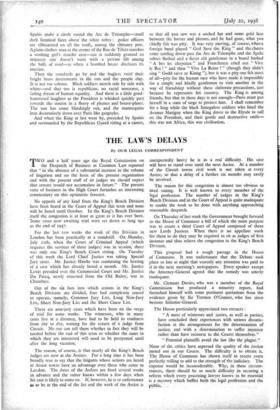THE LAW'S DELAYS
By OUR LEGAL CORRESPONDENT
TWO and a half years ago the Royal Commission on the Despatch of Business at Common LAw reported that " in the absence of a substantial increase in the volume of litigation and on the basis of the present organisation and with the present staff of 20 judges we should expect that arrears would not accumulate in future." The present state of business in the High Court furnishes an interesting commentary on this optimistic forecast.
No appeals of any kind from the King's Bench Division have been heard in the Court of Appeal this term and none will be heard until October. In the King's Bench Division itself the congestion is at least as great as it has ever been. Some cases now awaiting trial were set down as long ago as the end of 1937.
For the last two weeks the work of this Division in London has been practically at a standstill. On Monday, July x ith, when the Court of Criminal Appeal (which requires the services of three judges) was in session, there was only one King's Bench Court sitting. On Tuesday of this week the Lord Chief Justice was taking Special Jury cases. Mr. Justice Hawke was continuing the hearing of a case which has already lasted a month. Mr. Justice Lewis presided over the Commercial Court and Mr. Justice Du Parcq, newly returned from the Old Bailey, was in Chambers.
Out of the six lists into which actions in the King's Bench Division are divided, four had completely ceased to operate, namely, Common Jury List, Long Non-Jury List, Short Non-Jury List and the Short Cause List.
There are non-jury cases which have been on the verge of trial for some weeks. The witnesses, who in many cases live at a distance, have had to be held in readiness from day to day, waiting for the return -of a judge from Circuit. No one can tell them whether in fact they will be needed before the end of this term or whether the cases in Which they are interested will need to be postponed until after the long vacation.
The reason, of course, is that nearly all the King's Bench judges are now at the Assizes. For a long time it has been broadly true to say that the litigants whose actions are heard at Assize towns have an advantage over those who come to Lof,clon. The dates of the Assizes are fixed several weeks in advance and the suitor knows within a few days when his case is likely to come on. If, however, he is so unfortunate as so be at the end of the list and the work of the Assize is unexpectedly heavy he is in a real difficulty. His case will have to stand over until the next Assize. At a number of the Circuit towns civil work is not taken at every Assize, so that a delay of a further six months may easily be involved.
The reason for this congestion is almost too obvious to need stating. It is well known to every member of the legal profession. The number of judges in the King's Bench Division and in the Court of Appeal is quite inadequate to enable the work to be done with anything approaching reasonable despatch.
On Thursday of last week the Government brought forward in the House of Commons a bill of which -the main purpose was to create a third Court of Appeal composed -of three new Lords Justices. When there is no appellate work for them to do they may be required to sit as judges of first instance and thus relieve the congestion in the King's Bench Division.
This proposal had a rough passage in the House of Commons. It was unfortunate that the Debate took place so late at night that scarcely any attention was paid to it in the next morning's newspapers. Every speaker except the Attorney-General agreed that the remedy was utterly inadequate.
Mr. Clement Davies, who was a member of the Royal Commission but produced a minority report, had furnished himself with some pertinent quotations from- the evidence 'given by Sir Terence O'Connor, who has since become Solicitor-General.
The House particularly appreciated two extracts : " A mass of witnesses and jurors, as well as parties, have concluded their experiences with serious dissatis- faction at the arrangements for the determination of jnstice, and with a determination to suffer injustice rather than have recourse to the Courd themselves."
" Potential plaintiffs avoid the laiv like the plague.".
None of the critics have aspersed the quality of the justice meted out in our Courts. The difficulty is to obtain it. The House of Commons has shown itself in recent years perfectly willing to add to the strength of the judiciary. The expense would be inconsiderable. Why, in these circum- stances, there should be so much difficulty in securing a reform which every practising lawyer knows to be essential is a mystery which baffles both the legal profession and the Nike.











































 Previous page
Previous page